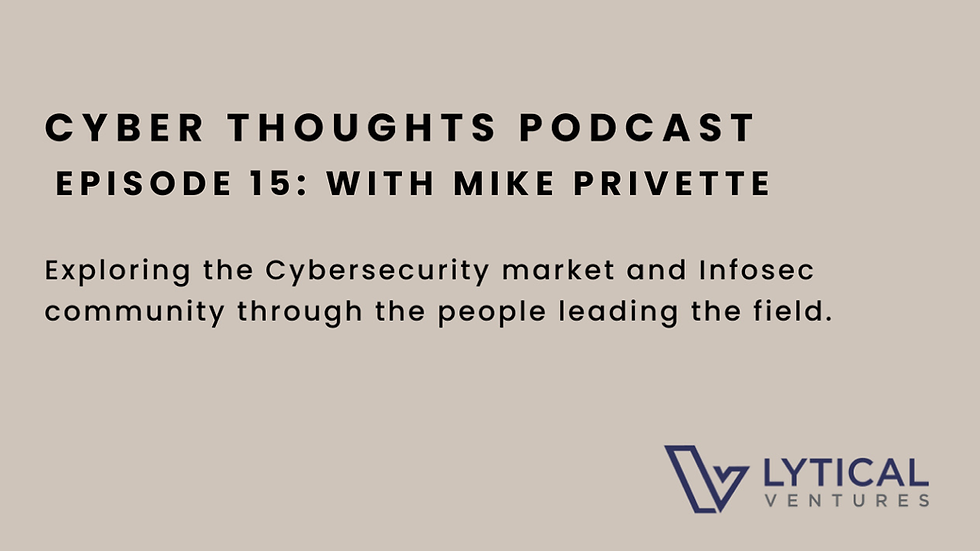Security Nihilism and the Myth of “Mooglezon” Invincibility
- Sep 10, 2025
- 4 min read
Cyber Thoughts Newsletter
SEPTEMBER 2025
Too Big to Breach
Security Nihilism (noun)
The belief that if a giant vendor like Microsoft, Google, or Amazon gets hacked, nothing you could have done would have mattered anyway.
(informal) A convenient excuse for not buying backup, resilience, or defense-in-depth solutions.
Usage:
Alice: “I don’t need a backup for Microsoft Outlook. If they go down, we have bigger fish to fry.”
Bob: “Nah, that’s just security nihilism.”
Back when we were investors in Wickr, a secure communication and collaboration platform (think Microsoft Teams or Slack with end-to-end encryption by default), we heard one pushback from buyers over and over: “If Microsoft gets hacked, we are toast anyway.” Translation: no need for a backup comms plan.
Then Microsoft did get popped, and most companies fell back to phone calls. You would think that would change minds. Oh, sweet summer child.
This is the TBTB™ (Too-Big-to-Breach) fallacy. The logic goes like this: the biggest service providers spend more on security than you spend on your entire IT budget, so they are basically invincible. And if they are not invincible, well, nobody is going to blame you. Great for job security, terrible for actual security. The board-room version usually goes like this “How could anyone expect Mooglezon Webservices to get hacked? They spend a kajillion dollars on security. What could we do?”
Anyway, speaking of misplaced confidence and unreasonable expectations… let’s talk about AI.
AI’s Hangover
We are back from summer, and now that VCs are really starting to dig in, there is a lot of chatter about how AI might be overhyped. Wait, overhyped? Say it ain’t so!
All of a sudden investors are back from their three weeks in Ibiza… sorry… Ibitha, and the think pieces are suddenly about how results matter and maybe funding anything with a .ai domain was a bad idea. Meanwhile, Anthropic raised another $13 billion at a $183 billion valuation, which is roughly the GDP of Hungary.
Sidebar: Round sizes by country GDP
In fact, we learned there are plenty of countries with GDPs under $1 billion. From now on, we are using them for round names.

“Frivilous.AI just raised $65M at a Kiribati post-money.” Tell us that does not sound cooler than “Series B.”
And doing a round at a “Tonga pre”?
Yes please!!!
Back to reality
We recently heard that even Anthropic, who relies heavily on Google TPUs instead of Nvidia GPUs, is resource constrained when it comes to answering queries. Plain English: there is not enough compute to satisfy demand. A lot of that demand is from startups selling one dollar for fifty cents, and there are infinite buyers at that price.
We are still big fans of AI. We also are not sad to see a little rationality creep back in.
Lastly, if you appreciate our highlighted content, please follow us on Twitter and LinkedIn, where we regularly post about things worthy of attention.
What We're Reading
Here's a curated list of things we found interesting.
TIME100 AI 2025
Lytical Advisor Allie Miller made this elite list. Congratulations Allie! Also, it’s a pretty impressive list, but the bumped Grimes? How dare they!
Meet the innovators, leaders, and thinkers reshaping our world through groundbreaking advances in artificial intelligence.
AI‑powered private school lands in Virginia
No teachers and only $65,000 a year? What a deal. Honestly, as a young hacker this is a dream, and we can’t imagine any unintended consequences.
An AI-driven private school is opening this fall in Northern Virginia, one of eight new campuses Texas-based Alpha Schools has in the works to double its U.S. footprint.
The lethal trifecta for AI agents: private data, untrusted content, and external communication
You asked for us to find more obscure blog content and we delivered. Ok, you didn’t ask, but this is a banger! Your data is very much at risk with LLMs. Here’s why.
If you are a user of LLM systems that use tools (you can call them “AI agents” if you like) it is critically important that you understand the risk of combining tools with the following three characteristics. Failing to understand this can let an attacker steal your data.
Transactions
Deals that caught our eye.
Mitsubishi Electric agrees to buy Nozomi Networks in deal valued at about $1B
Nozomi Networks, one of the world’s leading cybersecurity firms for critical infrastructure, will become a wholly owned subsidiary of Mitsubishi Electric, but will operate independently.
Podcasts
What we’re listening to.
Cyber Thoughts with Dimitry Shvartsman and Taylor Margot
In this episode, host Lucas Nelson is joined by Dimitry Shvartsman, co-founder of Prime Security, and Taylor Margot, Lucas’ partner at Lytical Ventures, for a special two-guest discussion. Dimitry shares his journey from two decades in security operations to co-founding Prime Security and explains how the company won this year’s Black Hat Startup Spotlight competition. The conversation covers how to craft a compelling application, the importance of cutting a pitch down to its essentials, and why storytelling matters just as much as technical credibility.
About Lytical
Lytical Ventures is a New York City-based venture firm investing in Corporate Intelligence, comprising cybersecurity, data analytics, and artificial intelligence. Lytical’s professionals have decades of experience in direct investing generally and in Corporate Intelligence specifically.







